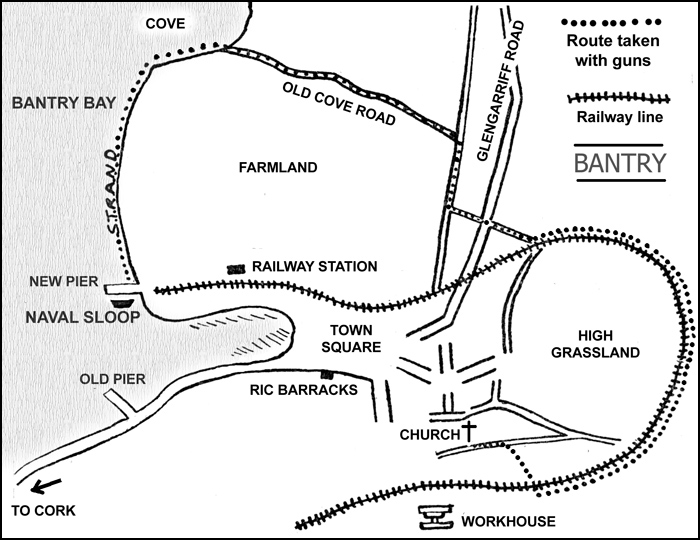Daring Arms Raid On Naval Sloop at Bantry
On Sunday night, November 17, 1919, members of the Fifth Battalion, Third West Cork Brigade, based at Bantry, made a daring haul of arms and ammunition that considerably enhanced the position of the Irish Republican Army in West Cork. Up to the time of the raid, the West Cork Brigade was still more or less an unarmed unit. A few revolvers and shotguns and a very limited supply of ammunition was the extent of their military hardware.
The fifth battalion, encompassing Bantry town and the western seaboard of the county, was then commanded by Maurice Donegan while Ralph Keyes was captain of the Bantry company. Bantry workhouse, situated three hundred yards above the town square, was at that time battalion headquarters of the King's Liverpool Regiment, a garrison of 200 men. In addition to the military there was also an RIC garrison of sixty men.
A familiar sight in Bantry in those days was a well armed British patrol boat. The boat usually anchored well out from the pier where it was considered safe from the attentions of the IRA. Week after week this sloop anchored out in Bantry Bay without incident. A feeling of security must have settled upon her captain for, despite the warnings of the police and military, he finally abandoned the custom of casting anchor out in the bay and decided to tie his boat up close to the New Pier, which was about 180 yards from the main square in Bantry. However, within twenty-four hours almost his entire complement of arms and ammunition had fallen into the hands of the enemy.
The decision having been made to attack the sloop, it was determined that four men should form the initial boarding party. Six others, to help in the ultimate removal of the arms, should wait by the railway station entrance until they were signalled forward after the boat's crew had been overpowered. In addition to these, two scouts were posted in the town square to keep the military patrol under observation and to signal its possible approach. Two further scouts were positioned by the railway station.
At about 8.30 in the evening, the four men who made up the boarding party approached the pier. They had between them two .38 revolvers and a few rounds of ammunition for each, a very inadequate stock of arms with which to undertake the capture of a British naval sloop.
Luck was with them however, for the sailor who had stood the watch by the wheel-house suddenly abandoned his post and went below to join his comrades. No sooner had his head disappeared below deck than the four IRA men leaped aboard. Drawing his gun, Maurice Donegan pulled open the hatchway to the cabin below and held up the sailors there. A vigorous blow from Donegan with a sledge hammer and the armoury door was burst open to reveal ten Ross-Canadian rifles, ten revolvers, a number of verey-light pistols and an assortment of ammunition. Within five minutes the little arsenal was completely cleared out. Thrusting a gun down the hatchway at the imprisoned sailors below, Donegan issued the warning that they were not to move or raise any alarm for at least an hour.
A storage place for the haul had been already decided upon before the raid had been undertaken, but it was a long and dangerous trek from the pier to that selected spot. What better storage position for the booty than the parish church! The sexton at the church was Mr. Keyes, father of Ralph who had played a significant part in the night's work. Unknown to the clergy of the parish, Mr. Keyes guided the men up the long ladder that led through the church ceiling up to the roof. There they placed the captured guns and there they remained in safety for months to come.
By then the alarm had been raised as the sailors aboard the gun-boat had not remained silent for very long. After half an hour one of them poked his head through the port-hole of the cabin and shouted for assistance. The night patrol had been in the town square, no more than a couple of hundred yards from the pier, during the time of the attack on the boat and now heard the shout for help. The volunteers had just reached the school when the bugle from the military post a few hundred yards away sounded the alarm.
In a moment the town was in uproar with army lorries speeding around, and army and police patrols scouring every street. It was, however, a fruitless night for the British garrison in Bantry. Despite widespread searches by them, no arrests were made and no trace of the guns was ever discovered.





